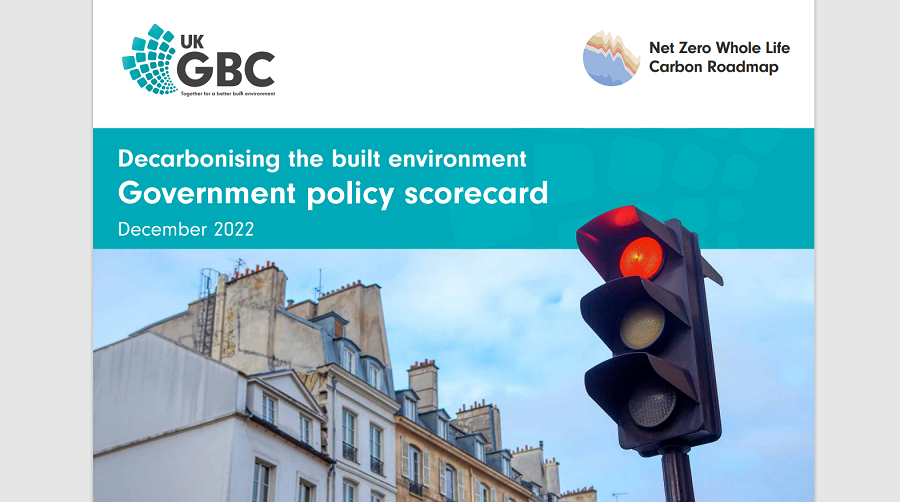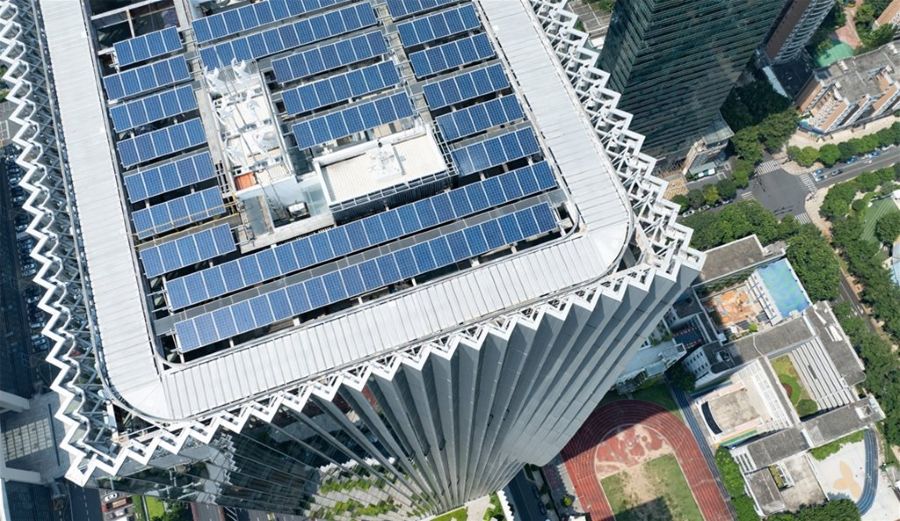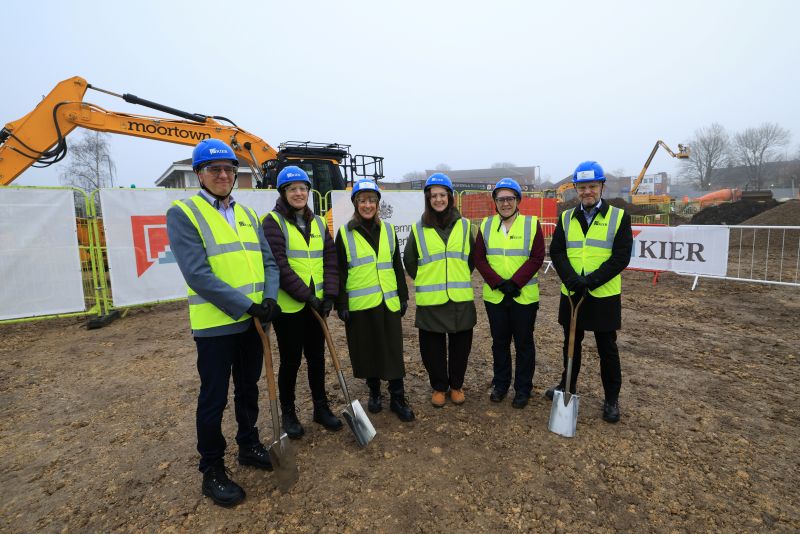A new scorecard from the UK Green Building Council (UKGBC) shows that the Government has made an alarming lack of progress in decarbonising the built environment over the past year.
UKGBC’s scorecard assesses progress since the Government’s Heat and Buildings Strategy launched in October 2021.
It compares the policies that have been announced or are in delivery against the comprehensive set of policy recommendations made in UKGBC’s Net Zero Whole Life Carbon Roadmap for the Built Environment – a science-based, industry-backed pathway, launched at COP26 in Glasgow, that has become a common vision and benchmark for the sector.
Focusing on operational carbon, embodied carbon and infrastructure, UKGBC has assessed the significance of each policy area, the policy gaps and the size of the economic prize if Government takes action this year. UKGBC’s analysis shows that most of the Government’s proposals or plans fail to deliver progress towards – or even actively hinder – a net zero carbon built environment.

Some of the key findings include:
- Given the context of rising costs of energy, comprehensive government policy to reduce energy use is even more essential to help relieve cost of living pressures, tackle inflation, and deliver energy security as well as producing jobs in every part of the country and stimulating the green economy
- Policies in place to enhance operational energy across the UK’s buildings are piecemeal and are not designed to drive the scale and pace of change needed. Current policies put us on track for only around half of the emissions cuts we need.
- There is no national strategy to decarbonise all our 29m homes, policy to decarbonize non-domestic buildings has frozen and draft policy for new homes and buildings standards from 2025 falls far short. England’s planning system currently frustrates rather than supports net zero and nature restoration goals.
- Embodied carbon is a huge gap in government policy and every year of delay drives up the costs of reaching net zero and makes the task more difficult to achieve in a condensed time period.
- Whilst progress has been notable in certain areas of infrastructure, it is vital that momentum is accelerated to fill the broader emissions gap and address key delivery risks.
The built environment is the UK’s second largest source of climate emissions after surface transport. UKGBC’s trailblazing members have shown that industry is ready and willing to take on the challenge, but they are calling for national government leadership to drive industry-wide progress, create incentives for crowding in investment and encouraging people and businesses to skill up and scale up respectively.
Three opportunities for government in the year ahead
The government only has until April 2023 to renew and reissue its policies to meet the UK’s net zero targets, after they were found by the courts to be “unlawful”. As the government prepares to respond to this legal challenge, incorporating three opportunities highlighted by UKGBC into its Net Zero Strategy will be essential to putting the UK onto a credible path to net zero by 2050 and boost the green economy in the year ahead.
1.Fast-track retrofit of the UK’s homes
Cutting energy waste from homes is one of the biggest opportunities the Government has to simultaneously tackle the cost-of-living crisis, energy security, inflation and levelling up. While some funds and initiatives for those in fuel poverty have been introduced, these only reach a small fraction of the homes that need attention. There are almost no policies to encourage and support owner occupiers to decarbonise their homes (the vast majority of the UK’s domestic properties) and no national retrofit strategy to upgrade all the UK’s homes. Bringing in experience from across industry, through the newly announced Energy Efficiency Taskforce, will be essential to turn things around.
2. Overhaul the planning system to support net zero
The Levelling Up and Regeneration Bill currently progressing through Parliament and forthcoming changes to the National Planning Policy Framework must be used to ensure new developments and infrastructure are fit for purpose with climate and nature improvement at their core.
3. Stop building homes and buildings that are not fit for net zero
Few homes and buildings built today are net zero and adapted to our changing climate. The Future Homes and Buildings Standard to be introduced in 2025 is the big opportunity to put that right. The forthcoming consultation on this must set us on a path to new buildings that are genuinely zero carbon and adapted to the changing climate.
The cost of inactivity far outweighs investment
The economic opportunities associated with investing in a net zero built environment are substantial and will ultimately pay for themselves over the long-term. With the UK’s interim net zero target of 78% reduction in carbon by 2035 just 12 years away, every year of delay both drives up the costs of reaching net zero and misses significant opportunities to grow our green economy.
Every year of inaction means the UK is missing out on:
- An annual household saving of over £700 on energy bills
- A jobs boom in the built environment sector at a time when unemployment rates are set to soar, which could see an additional 500,000 skilled local jobs over 10 years
- Saving the NHS £1.4bn in annual treatment bills for conditions related to cold homes and potentially saving 10,000 lives a year
- Preventing 10,000s of homeowners being locked into new-build homes every year that waste energy, are at risk to flooding and overheating, and will require costly upgrades
- A reformed planning system which encourages the re-use of existing buildings and delivers high quality new development that promotes sustainable lifestyles
Julie Hirigoyen, Chief Executive at UKGBC, said: “Bold ambitious government policy to decarbonise the built environment is a huge opportunity for the economy and for green businesses, yet our analysis shows it is largely missing within the current government’s agenda. Most areas of policy we have scrutinised have come back red rated, meaning detailed policy frameworks are largely missing, flawed, or do not put the UK on the path to meeting our climate commitments. In the last year we have seen baby steps when we need giant leaps.
“However, the new Government has a chance to put things right and the next year is critical. The size of the prize is huge in terms of saved energy bills, energy security, a massive jobs boom and levelling up and export opportunities. Stepping up action in this area is the definition of smart government and smart investment.”




















